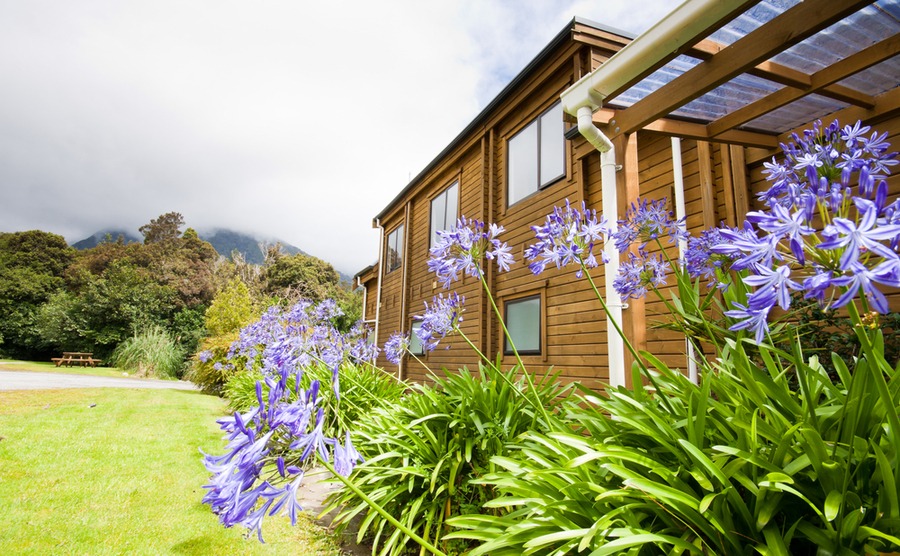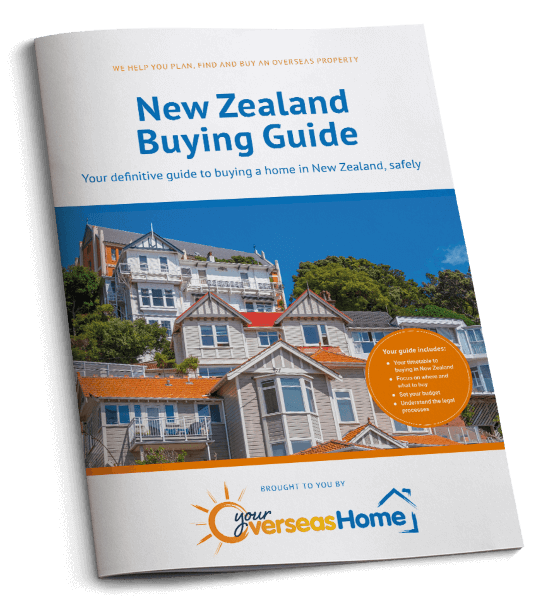For part two of our ‘Building your own Home’ series, we’re taking a closer look at how to find a reputable architect in New Zealand and what steps you need to take to obtain planning permission before you can build your dream home. And, if you missed part one, on buying the land, make sure to have a read!
Where can I find an architect in New Zealand?
Any dream house requires a dream architect – someone qualified to translate your ideas into structurally-sound plans. Also, any architect worth their salt will also assist with the wider project on key matters like setting and monitoring your budget, hiring and managing suppliers and building contractors, securing planning permission and sourcing materials for the build.
Make sure to get your free copy of the New Zealand Buying Guide – it covers everything you need to know about buying in this country.
Your first port of call when searching for an architect in New Zealand should be the New Zealand Institute of Architects Incorporated (NZIA). This official body is responsible for ensuring anyone working as an architect has the qualifications and expertise to do so. Choosing someone who is registered with these guys ensures you’re working with someone skilled and trustworthy. You can search for architects in your area using their search tool, or you can use the tool offered by the New Zealand Registered Architects Board.
Your first port of call when searching for an architect in New Zealand should be the New Zealand Institute of Architects Incorporated.
One thing to note is that there are a lot of architects in New Zealand, especially in the biggest towns and cities. Therefore, how are you supposed to choose between them? Word-of-mouth is a great way of finding someone excellent. Ask around. See who is advertising their services and do some online research into what people are saying about them. In addition to being registered with NZIA, you want to ensure they’re offering a service beyond what is expected of them. Create a shortlist of architects you like the look and sound of and ask to see their portfolio. Anyone worth their salt will have a bank of satisfied customers on the other end of the phone, and a wealth of examples of properties that they have built. If you want extra clarification, seek testimonials from past customers. Can you chat to them over the phone? Pop in to see the work for yourself?

Word-of-mouth is a good place to start with looking for an architect in New Zealand.
Another important element in choosing an architect in New Zealand is your impression of the person. You are going to be spending a lot of time in close proximity working on a project that won’t be without its stresses or setbacks. Prioritise finding someone that you can form a good working relationship with – someone you can express concerns to, who answers you efficiently, someone you feel has your back, understands what you want, and will do everything possible to make sure things run smoothly.
How much will an architect cost in New Zealand?
Every house build is different, and the costs will vary depending on the scope and ambition of the project. According to Building Guide New Zealand, the cost of an architect starts from around NZ$45,000 (£23,820), but can end up much higher depending on how involved they are, what duties they are assigned, and how sought-after they are.
How difficult it is to get planning permission?
Before you can start building your New Zealand home you will need to obtain planning permission, or ‘building consents’ as they are known in New Zealand. To be granted consent you must prove that the proposed building, plumbing, drainage and safety requirements comply with the Building Act 2004 and building code. The application process differs from local authority to local authority, so you will need to establish the procedure in your specific location. Typically, the application will require you to provide:
- Building plans and specifications
- Any other relevant information
- The building consent lodgement fee
Your architect will be able to lodge this application for you, and should be more than familiar with the process, the steps to take and when. It is possible in most regions to lodge this application online. Read the New Zealand government guide on building consents.
Get yourself fully prepped for your move to New Zealand by downloading your free Emigration Guide today!
Before you can apply for building consents, you need a Project Information Memorandum (PIM). You can apply for this yourself, or your architect in New Zealand can do so for you. A PIM provides essential information on the land you are about to build on, and information about legal requirements and regulations you have to follow during the build. The earlier in the building process you have this information, the better, as it will inform your actions and time frames moving forwards. It also helps to identify potential issues at an early stage in the process so you can plan accordingly. You can apply for your PIM online. You will need to provide the following:
- Applicant details and location of the building project
- Description of the building project including estimated value of the work, previous consents on the land, intended use of the building
- Any details relating to how the land will be affected, i.e. whether there be any building work over drains or sewers, whether there will be any changes to how vehicles access the property and so on.
The folks in charge of granting PIMs are the territorial authority, and they are legally obligated to respond within 20 days. This period can be extended if they require further information before the PIM can be granted.
How much does building consent cost?
Fees differ from local authority to local authority. In Auckland, for a complex building project you will pay $311 for a pre-application meeting, and for a project valued between $100,000-499,000 the total is $4,215 (£2,230), including processing and an inspection. Over $500,000, the total is $6,348.
Who applies for the planning permission?
While it is possible to lodge these forms yourself, a decent architect in New Zealand will tackle this admin for you. They lodge applications of this nature all the time. They know what’s needed, who to speak to, how to overcome problems that a novice might get stumped by. Although the architect will bill you for their time, it’s probably worth it to remove the hassle associated with the process.
The average build cost per square metre is around $2,000, although there is a lot of variation nationwide.
What you might need to budget for the build cost of a house?
Last year, CoreLogic released a report which concluded that the cost of building an average house in Auckland is NZ$445,000, and elsewhere in the country it is $395,000 (£209,120). Also, the report concluded that the average build cost per square metre is $2,000. However, the report also found that there are additional ‘invisible’ costs associated with building a house in New Zealand. These include:
- Fees and permits – design and architect fees, consent fees and permits.
- Land costs – the cost of buying the plot itself, and the cost of preparing the land ready for your house to be built on it.
- Administration costs – legal and mortgage fees, land surveys etc.
It is possible for building costs to get as low as $1,500 per square metre. $2,000-2,500 is average, but it can easily increase to $3,000 per square metre if you have a bespoke design. For a single level property on a flat piece of land with relatively simple plans, the total project cost could be estimated at $612,500. For a multi-level property on a sloping plot of land, the project total is $743,000. Finally, for something seriously swanky on a sloping plot of land, the final bill is likely to come in somewhere around $1,081,500. These costs include GST, but are just the building costs, so they don’t include the plot of land and the invisible costs listed above.

It is possible for building costs to get as low as $1,500 per square metre.
What about added extras?
Does your dream home absolutely have to come with a swimming pool? Perhaps a hot tub? We don’t blame you! However, it’s important to factor in these additional costs into that all-important budget. Now, you can choose to install the pool yourself if you want to save money. It’s possible to get DIY pool kits for $15,000 but installation costs will need to be factored in on top of that. In reality, it probably makes more sense to have a professional complete the installation on your behalf. That way, it’s less hassle, you have a guarantee, and if anything goes wrong, you can call someone else to deal with it. The cost to have something below-ground installed by a pro starts from around $35,000 but can go up to $70,000 for something larger. If you’re happy with an above ground pool, it is markedly cheaper. You’re looking at around $10,000 + installation costs. Prices for a hot tub (or spa pool as they are known in New Zealand) start from $5,000 and go up to around $40,000. Also, remember that pools cost a fair bit to run. Always check how much you will be adding to your monthly budget by having a swimming pool or spa pool at your house.
Where is it possible to make savings?
There are a number of ways that you can make savings on your home build. Firstly, establish what you can do yourself and what you are going to have to pay someone to do. While some jobs legally have to be done by qualified tradespeople, tasks like painting, tiling, gardening and so on, could be things you can tackle yourself. Secondly, do you really need an enormous house? Could you cut down the size of the project at all? You can knock a serious amount off the total with just a small adjustment to the size, and that saving could really reduce the stress and financial pressure of the build.
Read your free Property Buyer’s Guide to Currency from our partner Smart Currency Exchange to learn how to protect yourself from losing thousands of pounds when sending money to New Zealand for a house build.
Also, savings can be made when it comes to sourcing materials. Sure, the snazzy stuff might catch your eye but shop around – can you use reclaimed materials? Might the chap down the road offer you a deal because you’re a local customer? Do you really need golden taps? Ask your architect and builder where they think savings can be made as they have far more experience. They will be able to bring savings to your attention that you might not have thought of. It’s also worth consulting a quantity surveyor – not only will they be able to give you an accurate estimate of the full cost of the project but they will be able to help with money-saving strategies.
Where not to cut costs?
When building your New Zealand property, a qualified professional must complete your electrics, gas and plumbing. If that’s you – fantastic – if not, don’t scrimp – find someone reputable to avoid the risk of problems down the line. Also, sadly the sun doesn’t always shine in New Zealand, which means you need to consider how you will insulate and heat your house. Many opt for wood burners, which need to be installed correctly to ensure your house remains well ventilated. Always get a qualified professional to do the install for you. When it comes to insulation, the initial outlay may seem a lot, but the savings you will make overall are considerable.







